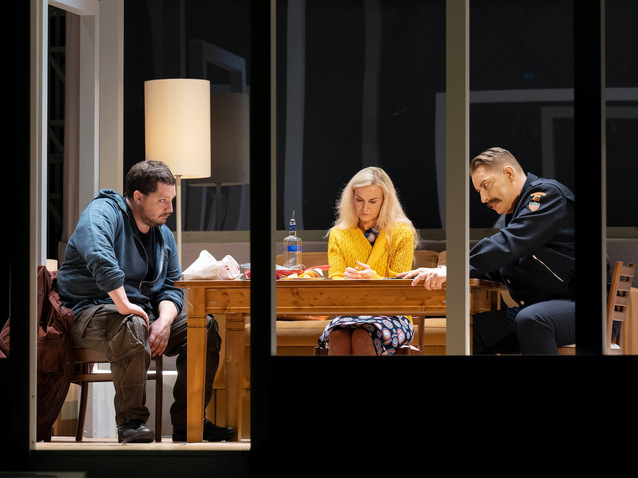 © Monika Rittershaus
© Monika Rittershaus
Staatsoper unter den Linden: A Walküre without any allusions
Gods are also just ordinary people in this lavish but stark production at the Staatsoper Berlin
Consistently, director Dmitri Tcherniakov refuses to use any conventional props on the second evening of the new Ring der Nibelungen at the Staatsoper unter den Linden. As in Rheingold, we find ourselves in the E.S.C.H.E Research Centre - the Scientific Centre for Human Development. During the overture, a short news video is shown - a convict has escaped from prison; identifying feature - a strand of white hair. Like Wotan's, by the way. Then we find ourselves in the office of the boss of the centre, with a large desk, where Wotan can follow the further action as a voyeur thanks to a one-way window into the flat of Hunding and Sieglinde, which lies conveniently just behind the office. This flat, in keeping with the style of the sterile furnishings of the entire centre, also designed by Dmitri Tcherniakov, has only white wooden frames outlining the rooms. No walls, but fully equipped with a refrigerator and chair, towel and glasses, a marital bed with white pillows and reading lamps and so forth. Sieglinde offers Siegmund a glass of water from the fridge, sits down with him on the sofa and so, in a relaxed chatting tone, they get to know each other. Tcherniakov does away with any traditional attributes - there is no full moon, no ash tree, only cold neon light.
As long as the viewer accepts that these traditional elements are not necessary or they are just figments of the composer's imagination, the concept works. Tcherniakov concentrates purely on the psychological relationships between the singers. He has demistified the gods as well as ordinary mortals, turning them into everyday humans going about their respective daily lives.
Hunding, excellently performed by Mika Kares, is a policeman or security guard, wants peace at home and treats Sieglinde like a pretty toy, expecting total devotion and fulfilment of his wishes from her. Vida Miknevičiūtė is this Sieglinde, slender and frail looking, with a penetrating soprano that has a fine tremolo that makes her seem even more fragile. Siegmund is interpreted by Robert Watson, whose voice has little radiance, but who embodies the uncertainty of his identity well. Only when he pulls the sword Nothung out of the wall does his portrayal strengthen. He then flees with Sieglinde into the cellar of the centre, past the cages with the live rabbits, where the lovers cower anxiously, awaiting their fate. The protagonists' acting skills are called upon in the second act, which again takes place in the boss's office: Michael Volle's Wotan and Claudia Mahnke's Fricka have a shouting match as an all-too-human couple, with the wife extoring her philandering husband. Wotan's giving in to Fricka’s demands is almost physically painful.
A semi-circular wood-panelled auditorium is the venue for the third act. The famous Ride of the Valkyries is recreated as a convivial team song for the sisters dressed in jogging suits – had there been American cheerleaders’ pompons, they would not have been out of place. This is where Brünnhilde brings the completely insecure Sieglinde. Anja Kampe shapes her role with a clear and energetic vocal line, with very good diction and natural energy. This Walküre wants justice to be done and will pay a high price for it. It is here that Wotan's anger at Brünnhilde's disobedience is vented, and it is here that the very touching farewell scene between father and daughter takes place. Especially the very last scene, accompanied with utmost empathy by Thomas Guggeis and the Staatskapelle, is ingeniously staged by Tcherniakov: Wotan remains in the auditorium, which recedes into the distance, while Brünnhilde, standing at the ramp with her backpack, looks after him and slowly turns to the audience and to being human as the final curtain falls.
As in Rheingold, Thomas Guggeis leads the Staatskapelle with a sure and sensitive hand, never covering the singers, with an extraordinary feel for the dramatic duct of the music. Justifiably, he is celebrated with ovations at the end, as are the singers.
Zenaida des Aubris
the 03 of November, 2022 | Print
Comments